#actually compulsive
Explore tagged Tumblr posts
Text
moral/harm ocd culture is asking "are you sure" 100 times when someone says you're not a bad person.
#actually ocd#ocd#ocd culture is#actually compulsive obssesive#actually compulsive#actually obsessive#actually neurodivergent#neurodivergent#obssesive compulsive disorder#obssesive#obssesive compulsive expectrum#x culture is#harm ocd#moral ocd#scrupulosity ocd
285 notes
·
View notes
Note
Refusing to say thoughts aloud or write them down out of fear of it coming to fruition
Obsessive/compulsive culture is…
#obsessive compulsive culture#cw intrusive thoughts#tw intrusive thoughts#actually compulsive#actually obsessive#ocd#actually ocd#obsessive compulsive
62 notes
·
View notes
Text
does anyone else have these compulsions where like whenever i’m on my phone i have to check who’s fronting for all my simplyplural friends (even if i don’t/barely know them)??? please this can’t be just me
-ash🌈🦖
#simplyplural#did#did system#actually did#osdd#osdd system#actually osdd#compulsion#actually compulsive#obsessive compulsive behavior#obsessive compulsion#firefly flickers
53 notes
·
View notes
Text
"Y'all ever wanna [graphic intrusive thought]?"
"...No???"
Intrusive thought below cut, with talk of self-injury as context
So, we've been compulsively scratching at our ear, to the point of bleeding, and have been doing it for several days (maybe a week? longer?) now, and any time it heals, we've been scratching off the scab, so it HURTS and it's messy and it's having a hard time healing
We know it needs to heal, we KNOW we need to stop scratching at it so it can heal, but it's really fucking hard
Plus, where it's located, we can't put a bandaid or gauze on it or anything like that to block access to it
Anywho, while resisting the urge to scratch at it, was hit with a fun /sarcasm intrusive thought that involved scratching and peeling off all our skin and gouging out our eyes in a feral and bloody manner :)
#shitpost#screaming into the void#obsessive compulsive#obsessive thoughts#compulsive behaviors#self harm#self harming behaviors#unintentional self harm#intrusive thoughts#actually obsessive#actually compulsive#actually obsessive compulsive#intrusive thinking
6 notes
·
View notes
Note
My entire existence feels like that one meme of "But why?" I don't know why I lie so much about literally everything but I also just. Do Not Care. It's like the universe gave me one (1) whole emotion and guilt/remorse is not one of them.
-⚔️
.
#actually compulsive#compulsive liar#compulsive lying#defensive liar#defensive lying#pathological liar#pathological lying
4 notes
·
View notes
Text
Okay so actually obsessive has BPD yanderes in it and actually compulsive has compulsive liars in it, so is there another tag that ocd people use? Because actually ocd doesn’t seem very popular
No hate to irl yanderes or compulsive liars btw, you guys just aren’t the blogs I’m looking for
#actually obsessive#actually compulsive#actually ocd#ocd#obsessive compulsive disorder#on my soapbox
2 notes
·
View notes
Text
Guilt is a feeling after compulsive actions, thoughts or situation. It is all the what-ifs that keep crawling through your spine until all that is left is the sadness or remorse about things that you could’ve done but didn’t do. It is the worst feeling that drowns you with its intensity. Working on your id to satisfy your needs may result in guilt. You may ask what id is? It is the act of doing things according to one’s own will that may or may not bound to societal norms. They are basically the impulsive thoughts one has like breaking something or doing something unreasonable. People call id selfish but I think id is the suppressed want of a person that is not fulfilled due to the adherence of societal norms and expectations. I sometimes wonder that what will happen if there is a day when one can do whatever they want without any limitations. Would it create a disaster? Maybe, maybe not. I don’t what would it result to but i do know that it will be the day when the suppressed id will be let free.
#love#poetry#words#quotes#literature#poets on tumblr#love poetry#spilled poetry#lit#moonchild#actually compulsive#id#guilty pleasure#i feel so guilty#guilt#selfish
12 notes
·
View notes
Text
Life-changing OCD hack is learning that you can literally call poison control to check if you fucked up and took medications wrong in a way that could kill you instead of having a panic attack while reading reddit and quora threads for an hour. They won't even be mad at you. Like obviously don't do it every day or something but genuinely you can do this if you need to
32K notes
·
View notes
Text


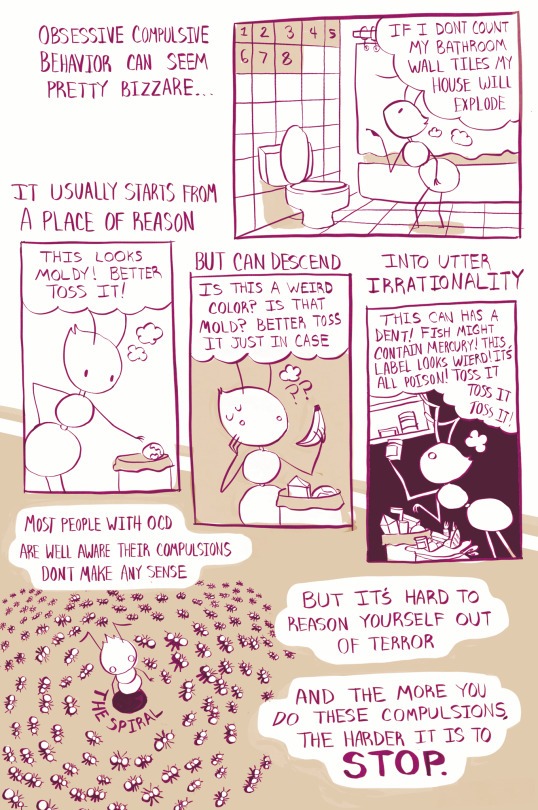
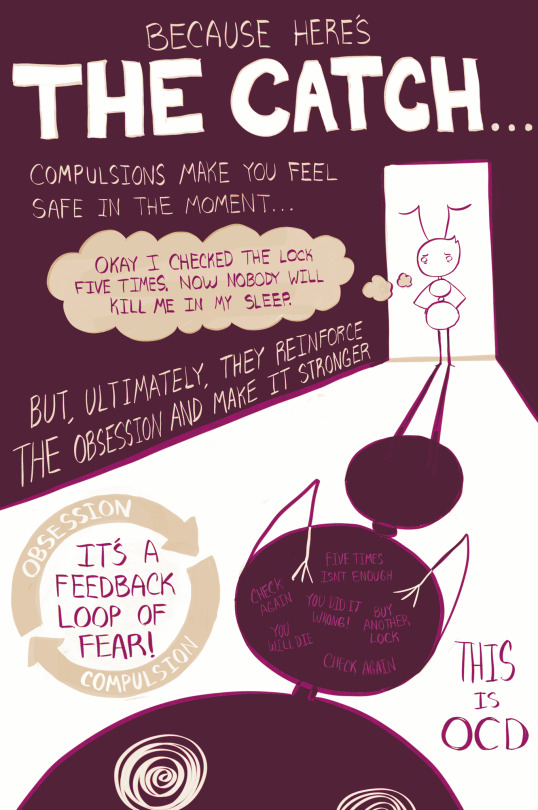

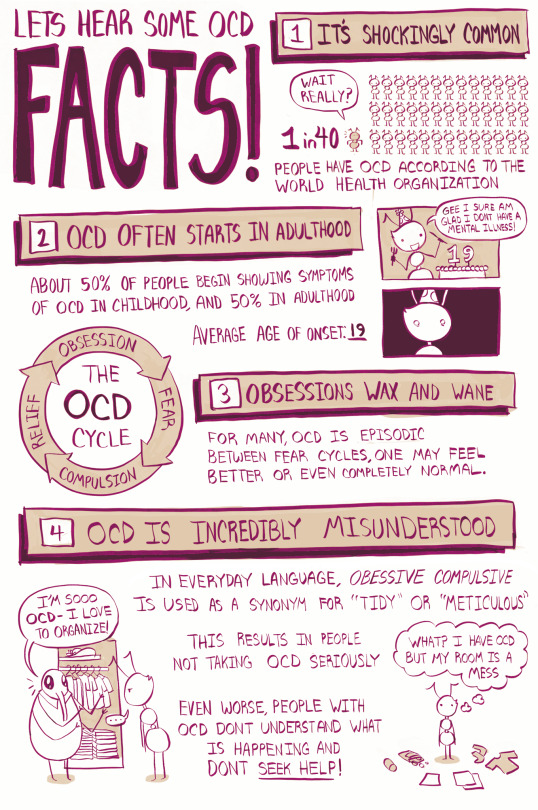
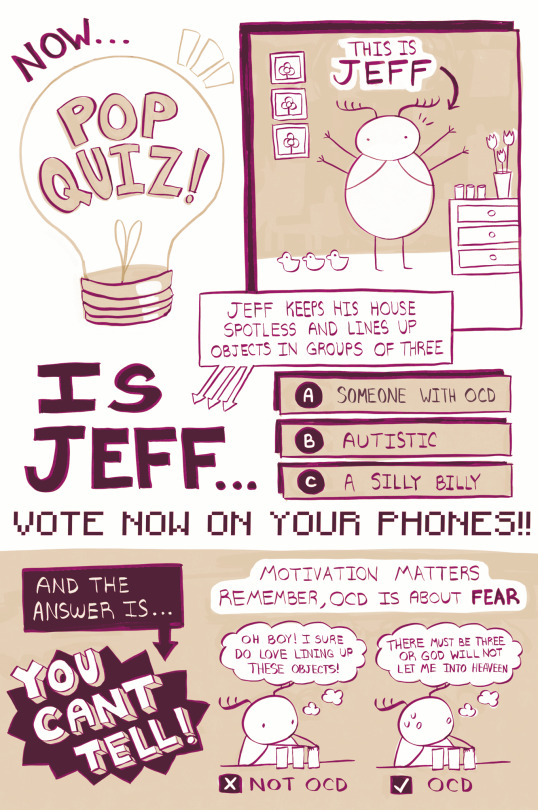


Greetings bugs and worms!
This comic is a little different than what I usually do but I worked real hard on it—Maybe I'll make more infographic stuff in the future this ended up being fun. Hope you learned something new :)
If you are still curious and want to learn more about OCD, you can visit the International OCD Foundation's website. I also recommend this amazing TED ED video "Starving The Monster", which was my first introduction to the disorder and this video by John Green about his own experience with OCD.
The IOCDF's website can also help you find support groups, therapy, and has lots of online guides and resources as well if you or a loved one is struggling with the disorder. It is very comprehensive!
Reblog to teach your followers about OCD
(But also not reblogging doesn't make you evil, silly goose)
#actually ocd#ocd#ocd tag#obsessive compulsive disorder#mental illness#mental health#neurodivergent#infographic#informative#comic#webcomic
69K notes
·
View notes
Text
ocd burnout isn't talked about enough. it may seem like i'm doing nothing to you, but i'm trying so so so hard just to make it through each day.
#ocd#obsessive compulsive disorder#actually compulsive#actually obsessive#burnout#actually ocd#ocd tw#ocd recovery
1 note
·
View note
Text
my range of emotions go from “it’s scary how much i feel” to “it’s scary how much i don’t feel”
#actually borderline#actually bpd#bpd#bpd thoughts#bpd vent#fearful avoidant#bpd blog#compulsive liar#bpd safe
6K notes
·
View notes
Note
moral ocd culture is wow. that was ocd? i thought everyone was worried about being a good person at every waking moment of their lives
i could have wrote this myself omg
#actually compulsive obssesive#actually ocd#ocd#actually compulsive#actually obsessive#obssesive#obssesive compulsive disorder#obssesive compulsive expectrum#actually neurodivergent#ocd culture is
109 notes
·
View notes
Text
obsessive/compulsive culture is overthinking, then realizing you’re overthinking and overthinking your overthinking, then realizing you’re overthinking your overthinking and overthinking your overthinking of overthinking, and then-
57 notes
·
View notes
Text
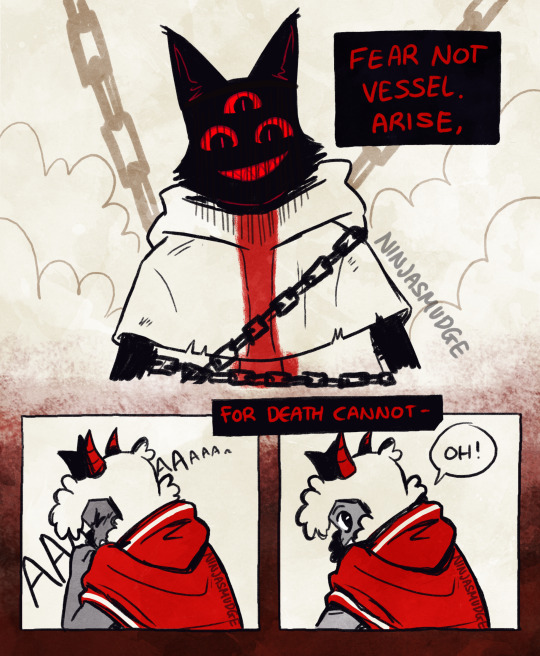

sorry that i yell this at him every time i die in-game.
anyway i think the adrenaline rush of death is one hell of a drug
#cotl#cotl lamb#cotl narinder#cult of the lamb#narilamb#narinder#my art#compulsively shouting this out at him#but like. not actually shouting bc i am in my home with other people usually at 2am#but. you get it
10K notes
·
View notes
Text
So
obsessive compulsive
Not fun
Our ear had finally healed
✨️not anymore✨️
#shitpost#screaming into the void#obsessive compulsive#actually obsessive#actually compulsive#self injury#minor injury
1 note
·
View note
Note
It’s not really a confession but sort of I guess? More like a habit I have gotten to sort of help with this. Which is I have started to when I type, and I notice I’m typing a lie, to just put in parentheses next to it the word “lie” with the truth or the closest version of it next to it, sometimes I don’t really put anything next to it cause I can’t find the words to type the truth, so I just leave a nice little “(lie)” next to the text I do.
I haven’t found a way to, you know, use that in actual conversations yet, wether verbal or written, but it has helped with deconstructing lying to myself in my diary and in general when I’m alone. Or well, more like it makes me realize when I lie, and I hope it sort of stops me from lying at all when it’s just me alone
.
#actually compulsive#compulsive lying#compulsive liar#defensive liar#defensive lying#pathological liar#pathological lying#going to start doing this too anon thats really smart
5 notes
·
View notes